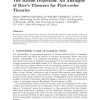Free Online Productivity Tools
i2Speak
i2Symbol
i2OCR
iTex2Img
iWeb2Print
iWeb2Shot
i2Type
iPdf2Split
iPdf2Merge
i2Bopomofo
i2Arabic
i2Style
i2Image
i2PDF
iLatex2Rtf
Sci2ools
IGPL
2008
2008
The Ricean Objection: An Analogue of Rice's Theorem for First-order Theories
We propose here an extension of Rice's Theorem to first-order logic, proven by totally elementary means. If P is any property defined over the collection of all first-order theories and P is non-trivial over the set of finitely axiomatizable theories (i.e., P holds for some, but not all theories), then P is undecidable. This not only means that the problem of deciding properties of first-order theories is as hard as the problem of deciding properties about languages accepted by Turing machines, but also offers a general setting for proving several undecidability results in first-order theories. 1 Undecidability in logic and computer science The undecidability of computational problems by Turing machines (TM) is a formidable theoretical result that affects the practice of computer programming. Rather than being isolated, undecidability is an ubiquitous phenomenon, in the sense that any relevant (non-trivial, in the sense of holding for some pograms but not all of them) property ab...
| Added | 27 Dec 2010 |
| Updated | 27 Dec 2010 |
| Type | Journal |
| Year | 2008 |
| Where | IGPL |
| Authors | Igor Carboni Oliveira, Walter Alexandre Carnielli |
Comments (0)

